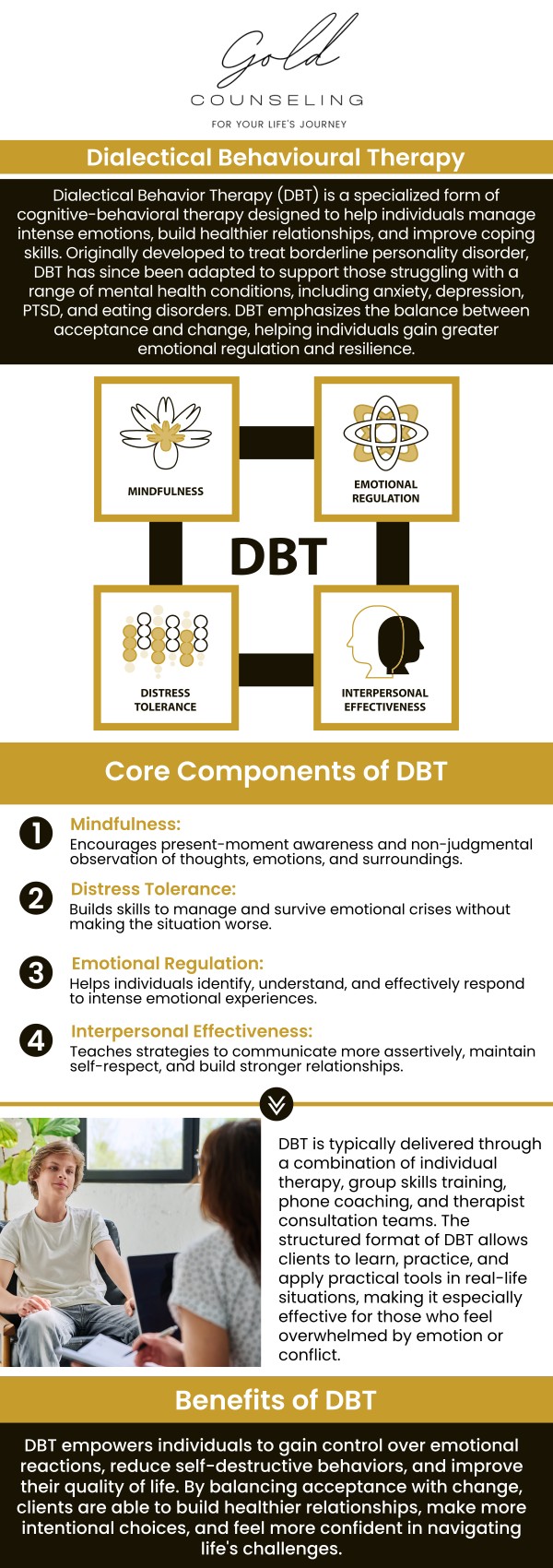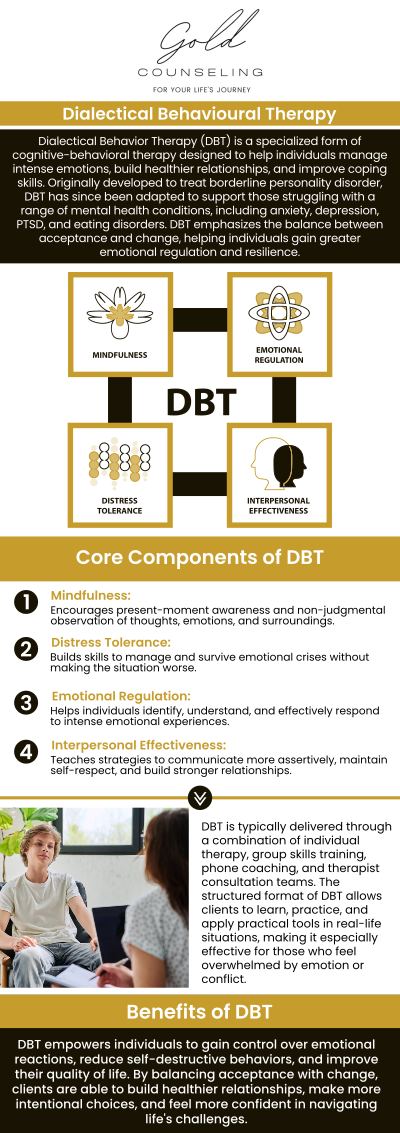Dialectical Behavior Therapy (DBT) Q&A
One of the most important things dialectical behavior therapy (DBT) does is help people properly control their emotions. DBT emphasizes identifying external triggers and connecting them with appropriate coping mechanisms and reactions. Dialectical Behavior Therapy (DBT) is available at Gold Counseling. For more information, contact us or book an appointment online. We have convenient locations to serve you in Riverdale, Kaysville, Draper, and St. George UT.




Table of Contents:
How is DBT different from CBT?
What is DBT typically used for?
What symptoms does DBT help with?
What are the Benefits of Dialectical Behaviour Therapy?
Cognitive Behavioral Therapy (CBT) and Dialectical Behavior Therapy (DBT) represent distinct forms of behavioral therapy, each offering valuable support for a wide spectrum of mental health conditions. The choice between these therapies hinges on your unique mental health needs and objectives.
DBT, a specialized form of CBT, focuses on helping individuals susceptible to intense emotional reactions, guiding them in cultivating more composed and emotionally healthier interactions with their surroundings.
DBT, a subset of CBT, is customized to empower individuals to acknowledge their emotional distress while maintaining a sense of safety and well-being. It fosters the capacity to make informed choices that steer clear of impulsive or harmful actions.
While some focus remains on addressing thoughts, DBT places a significant emphasis on recognizing external triggers and matching them with healthy coping mechanisms and responses. Positioned within the broader scope of CBT, DBT helps individuals specifically with mindfulness, interpersonal skills, managing crises, and emotional regulation. In contrast, traditional CBT is based on accessing the connection between emotions, thoughts, and behaviors, aiming to replace counterproductive thought and behavior patterns with more beneficial alternatives.
CBT concentrates on understanding and altering one’s cognitive and behavioral responses. CBT and DBT distinguish themselves not only in what they teach but also in how these therapies are administered and tailored to the individual’s needs.
DBT helps individuals who are suffering from intense or volatile emotions and self-destructive behaviors. DBT plays a pivotal role in assisting individuals in effectively managing their emotional responses.
DBT specifically targets those who have developed recurring patterns of intense emotional reactions and impulsive actions as a response to overwhelming sensations of being at odds with their surroundings, this can manifest as feelings of societal neglect or rejection.
For individuals contending with certain mental illnesses and suicidal thoughts, DBT can be one of the most effective treatment forms available.
DBT is most commonly applied in the treatment of individuals diagnosed with borderline personality disorder (BPD) or those experiencing challenges with emotional regulation.
Nevertheless, it is a versatile treatment with a range of applications and can be integrated into the therapeutic management of various mental health conditions as a sole treatment or to complement other therapeutic interventions or medications. Individuals diagnosed with BPD typically struggle to regulate their emotions, which often leads to tumultuous relationships and poor self-esteem.
These emotional struggles may manifest in self-harming behaviors or the presence of suicidal ideation.
This form of therapy is beneficial for individuals with various mental illnesses that lead to challenges in managing their emotions or engaging in self-destructive behaviors, including issues such as eating disorders and substance use disorders. Additionally, it is occasionally employed in the treatment of post-traumatic stress disorder (PTSD).
A distinguishing feature of DBT lies in its emphasis on embracing a patient’s experiences. The primary objective of DBT is to validate patients’ emotions and the challenges they face to promote the advantages of change.
Your therapist will guide you in acquiring new skills designed to enhance your ability to regulate emotions.
The specific benefits patients glean from DBT will depend on their willingness to engage with the practices and make the necessary behavioral adjustments over time. Some techniques employed include mindfulness practices that help patients focus on their awareness of the present instead of being preoccupied with worries.
The skills learned in DBT can help patients build and repair relationships as they help improve their social skills learning how to better communicate their feelings and set boundaries. Like other forms of CBT, DBT can also help patients manage their emotions when confronted with external stressors.
Dialectical Behavior Therapy (DBT) is available at Gold Counseling. For more information, contact us or book an appointment online. We serve patients from Riverdale UT, Washington Terrace UT, Clinton UT, Kaysville UT, Clearfield UT, Farmington UT, Draper UT, Riverton UT, Sandy UT, St. George UT, Bloomington UT, Santa Clara UT, and surrounding areas.
Check Out Our 5 Star Reviews



Additional Services You May Need
▸ Relationship Counselling
▸ Couples Counselling
▸ Individual Therapy
▸ EMDR Therapy
▸ Spiritual Healing
▸ Disordered Eating
▸ LGBTQIA+ Therapy
▸ Group Psychotherapy
▸ Life Coaching Therapist
▸ Depression Treatment
▸ Mental Health Clinic
▸ Life Transition Therapy
▸ Telehealth Counseling
▸ Cognitive Behavioral Therapy (CBT)
▸ Dialectic Behavioral Therapy (DBT)


